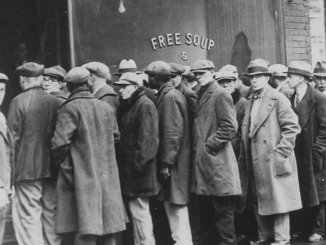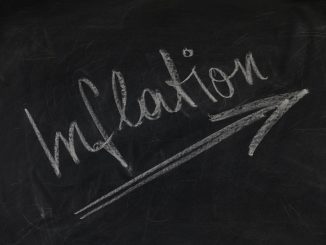A penny saved may be a penny earned. But don’t count on it still being worth the same amount when you want to spend it – especially if Harvard economist Kenneth Rogoff gets what he wants.
As the Federal Reserve does everything it can to dump new money into the economy, many people, myself included, are convinced that we are headed toward a period of potentially serious inflation. Most of those people are equally convinced that inflation is a bad thing. It is, after all, one of the two ingredients in the so-called misery index.
In recent comments, however, Rogoff has advocated intentionally creating “moderate inflation of, say, 4 to 6 percent for several years.” In an opinion piece in the Financial Times, he acknowledged that his proposal might be anathema to some, but said “a once-in-75-year crisis calls for outside-the-box measures.”
The idea behind the inflationary solution is to get people out of debt by effectively reducing the amounts they owe. A $100,000 mortgage stays a $100,000 mortgage, but, if a government can churn up a 4 to 6 percent inflation rate, that $100,000 becomes a smaller amount relative to the cost of other goods and wages. According to Rogoff, the main issue facing our economy is “a huge overhang of debt,” so anything that helps debtors pay back what they owe for less is a good thing.
Rogoff’s view has been a particularly hot topic in the financial press, since he is generally known as a conservative thinker. As recently as 2008, he specifically rejected the idea of temporary inflation as salve for personal debt, writing in the Financial Times, “However convenient it may be to have several years of elevated inflation to help bail out homeowners and financial institutions, the gain has to be weighed against the long-run cost of re-anchoring inflation expectations later on.”
What Rogoff recognized then, and seems to have forgotten now, is that what goes around comes around. When debtors pay less, creditors get less back.
Back when banks operated as banks, rather than as government-backed hedge funds, savers deposited their money in the bank in exchange for a reasonable rate of interest. Banks would then lend that money to borrowers at higher rates of interest. Borrowers accepted those rates, either because they were willing to pay a premium to have money now rather than later, or because they believed they could get an even higher rate of return themselves. Banks made their profit on the spread between what they paid depositors and what they charged borrowers.
Following the bank failures of the Great Depression, a fourth party, the federal government, entered the equation to ensure that savers would not lose their money if a bank made too many bad loans and was unable to absorb its losses. Now the government guarantees depositors’ money in exchange for banks’ insurance premium payments and the ability to conduct oversight.
For quite a while, that system worked pretty well. Then it stopped working. Banks made too many loans to people who could not repay them. Meanwhile, the federal government changed from an independent overseer to one of the biggest borrowers in town. Both events have given the government a substantial interest in trying to make money cheaper, both for itself and for all the other borrowers whose debt the government supports through instruments like the government sponsored mortgage bankers Fannie Mae and Freddie Mac.
The result is that savers get punished. Instead of banks actively seeking out depositors, savers are increasingly being seen as a burden. Citibank (C) and others have even started charging customers to hand over their cash, while Bank of America made headlines recently with its plans to start charging most customers for using their debit cards. For many savers, banks have become places to spend money rather than a place to make money.
This is not just unfair to savers. It indirectly harms borrowers as well, and, ultimately, it keeps the economy from recovering.
Since talking about the “price” of money can be confusing, let’s talk about eggs.
Imagine that Americans develop a huge appetite for eggs. Unfortunately, they can’t afford as many eggs as they want. To appease both the people and the White House chef – who, it turns out, is a dedicated connoisseur of egg-filled dishes – the government steps in and offers to sell eggs at five cents apiece. For a while, everyone is very happy. Quickly, though, they realize that farmers are unwilling to compete by selling their eggs at a price that would result in a loss. All the private farmers abandon the egg business, leaving the government as the sole purveyor of eggs. Soon, there is an egg shortage. Price controls almost always result in scarcity of the goods in question.
The lesson here is that if the government makes a business unprofitable, private parties get out of it. Low interest rates and high inflation make the money-lending business as unprofitable as the egg business in our example. As a result, while loans are cheap for those who can get them, savers and banks are reluctant to lend, and many people are unable to borrow money at all. These people then can’t make the sorts of investments that are necessary to fuel economic growth. Instead of rescuing the economy by getting people out of debt, the plan of cheapening money through inflation produces stagnation.
There is also the problem that, sooner or later, banks and foreign governments are going to stop lending money to the U.S. government. If the government announces its plan to pay back its debts in currency worth less than what it’s getting, lenders are going to raise interest rates to make up the difference. The cost of servicing our national debt will skyrocket, placing more pressure on taxpayers and draining more money that could otherwise be used for investment.
Rogoff says desperate times call for desperate measures. Yet his comments seem to be evidence that desperate times produce desperate thinking. All of the objections he raised to inflationary policy in the past still apply. What has changed is that we have come to the scary but true realization that much of the money that has been borrowed cannot be repaid. The losses left over from our runaway spending holiday need to be allocated somehow. To the extent that banks can absorb the losses and survive, they will need to do so. When they cannot, the rest of us will end up paying the difference through a combination of higher taxes, higher interest rates and, yes, higher inflation, which is the almost inevitable result of the money the government is creating so it can be shoveled into the banking system.
No society has ever built lasting prosperity by deliberately devaluing money. Prosperity is built on savings and investment. Inflation inhibits both. We keep trying to get the economy back to normal by making the credit markets more and more abnormal. It has not worked yet, and I don’t think it is likely to work anytime in the future.
Instead, the “new normal” will likely look surprisingly like the old normal – the one that came before the illusory growth and binge spending of the 1990s and the 2000s. Borrowers need to be prepared to pay back what they borrow, banks need to be encouraged to make loans, and savers need to be allowed to save.
Disclaimer: This page contains affiliate links. If you choose to make a purchase after clicking a link, we may receive a commission at no additional cost to you. Thank you for your support!





Leave a Reply